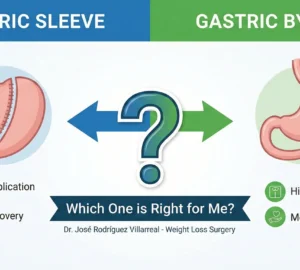Choosing between gastric Sleeve vs gastric Bypass can be a daunting decision. Both are effective weight loss surgeries, but they have distinct advantages and disadvantages. For individuals considering bariatric surgery, gastric sleeve (sleeve gastrectomy) and gastric bypass (Roux-en-Y gastric bypass) are two of the most popular options. While both procedures result in significant weight loss, patients often wonder which surgery leads to better long-term success. This article explores the effectiveness of weight loss longevity at the 10-year post-surgery mark, comparing the two procedures based on weight loss percentage, health benefits, and potential complications.
Sleeve vs Bypass: How They Work
- Removes about 75-80% of the stomach, creating a smaller, sleeve-shaped stomach.
- Limits food intake and reduces hunger hormones like ghrelin.
- A restrictive procedure that does not involve rerouting the intestines.
- Creates a small stomach pouch and reroutes the small intestine to bypass a portion of the digestive tract.
- Combines restriction and malabsorption, reducing calorie and nutrient absorption.
- Alters gut hormones to reduce hunger and improve insulin sensitivity.
Weight Loss Effectiveness at the 10-Year Mark
- Gastric Sleeve: Patients typically lose 50-60% of excess weight and maintain around 40-50% excess weight loss (EWL) after 10 years.
- Gastric Bypass: Patients experience 60-70% excess weight loss initially and maintain 45-60% EWL after 10 years.
- Winner: Gastric bypass generally results in slightly greater long-term weight loss and better weight maintenance.
Regain Rates and Long-Term Challenges
- Gastric Sleeve: Some studies indicate a higher rate of weight regain over time due to the lack of intestinal rerouting and hormonal changes.
- Gastric Bypass: Regain is lower than gastric sleeve but still possible, particularly in patients who do not adhere to lifestyle changes.
Resolution of Obesity-Related Conditions
- Both procedures significantly improve or resolve:
- Type 2 diabetes (Bypass shows better remission rates)
- Hypertension
- Sleep apnea
- High cholesterol
- Gastric Bypass leads to better metabolic improvements due to its hormonal impact.
Complications and Nutritional Deficiencies at 10 Years
Let’s compare the speaks about gastric sleeve vs gastric bypass with regards to 10 years of nutritional deficiencies.
- Fewer complications overall.
- Lower risk of malnutrition but some risk of B12, iron, and vitamin D deficiencies.
- Potential risk of acid reflux or GERD.
- Higher risk of dumping syndrome (rapid gastric emptying causing nausea and weakness).
- Increased risk of nutritional deficiencies (B12, iron, calcium) requiring lifelong supplements.
- Potential for intestinal complications due to bypassed gut sections.
Which Surgery is Better for Long-Term Weight Loss?
- Patients with a lower BMI and fewer comorbidities may do well with gastric sleeve.
- Patients with a higher BMI, diabetes, or severe metabolic disorders may benefit more from gastric bypass.
- Patients concerned about long-term weight maintenance may find gastric bypass offers more sustainable weight loss.










